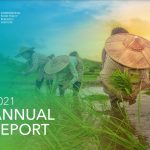Journal Article Governments and development agencies increasingly promote agro-clusters as a pathway to improving smallholder incomes and ensuring inclusive rural development through mitigating production and market risks. However, there is very limited empirical evidence to support this promise. We use a large farm household survey of about 4000 smallholder farmers in Ethiopia growing cereals like […]
IFPRI’s 2021 Annual Report
IFPRI’s 2021 Annual Report presents highlights from our research work around the world. Cutting-edge research on the impacts of the COVID-19 pandemic and related policies, and on our strategic research areas—climate resilience and sustainability, healthy diets and nutrition, inclusive and efficient food systems, institutions and governance, and rural transformation, as well as cross-cutting work on […]
2022 Global food policy report: Climate change and food systems
Global Food Policy Report Climate change threatens our food systems and the multiple development goals linked to sustainable food system transformation. Action is urgently needed, both to increase adaptation and resilience and to achieve major emissions reductions. Current efforts must be stepped up and greatly expanded to ensure food security, nutrition, and well-being for all […]
Predictors of prediabetes/diabetes and hypertension in Ethiopia: Reanalysis of the 2015 NCD STEPS survey using causal path diagrams
Journal Article The objective of our study was to reanalyse the Ethiopia STEPwise approach to Surveillance Noncommunicable Disease Risk Factors survey (NCD STEPS), using causal path diagrams constructed using expert subject matter knowledge in conjunction with graphical model theory to map the underlying causal network of modifiable factors associated with prediabetes/diabetes and hypertension. We used […]
Does a joint United Nations microfinance ‘plus’ program empower female farmers in rural Ethiopia? Evidence using the pro-WEAI
Journal Article Microfinance is thought to be an effective tool for empowering women. Yet, previous studies that evaluate microfinance programs have mixed findings. This is in part because there are large variations in the interventions that are evaluated, but also that there is not a standardized metric of empowerment that is implemented consistently throughout the […]
- « Previous Page
- 1
- …
- 41
- 42
- 43
- 44
- 45
- …
- 123
- Next Page »




